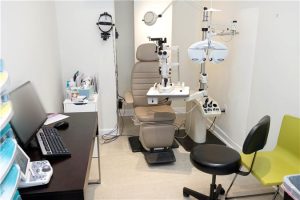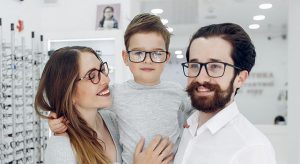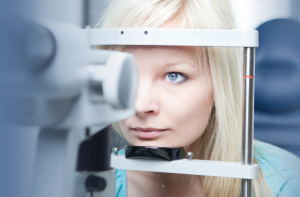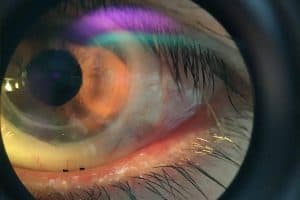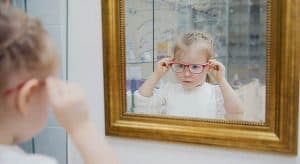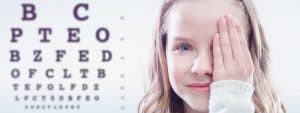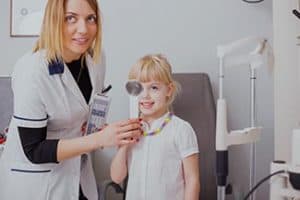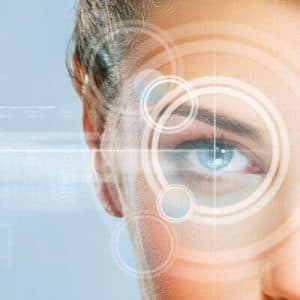Nearsighted or Farsighted?
Have you been told you are ‘nearsighted’ or ‘farsighted’ but not totally sure what they mean? Both of these may require you to rely on
Read MoreWhy Are Eye Exams Important?
Are Eye Exams Important? Yes! Many eye conditions, in their early stages, have no obvious signs or symptoms, so the annual exam is often the only way to detect eye conditions early. Since there are often no signs or symptoms, regular comprehensive eye exams are key to maintaining good vision and healthy eyes.
Read MoreTinted Lenses for Color Blindness
An estimated 1 in 12 men and 1 in 200 women has some degree of color blindness. Color blindness is not an actual blindness, but
Read MoreWhich Frames Are Best for Playing Sports?
Sports-related eye injuries are one of the leading causes of visual impairment and vision loss among children in the United States.
Read MoreChoosing Glasses for Your Face Shape
When shopping for new eyeglasses, finding frames that fit your style and make you look your best should not be overwhelming or difficult… if you know what you are looking for.
Read MoreOptical Lenses for Children
Which optical lenses are best for children? If you are purchasing new eyeglasses for your child, you may not even be aware that different lens options exist. While your optometrist will be able to guide you and recommend a specific type of lens for your child’s individual needs, it is a good idea to familiarize yourself with the different lens materials.
Read MoreDo I Need Coatings on My Lenses?
Wondering if lens coatings are absolutely necessary or just an added bonus? When purchasing new eyeglasses, many eyecare professionals will recommend adding a coating to
Read MoreAnswers to Your Top 6 Questions about COVID-19 and Your Eyes
With healthcare information changing daily amidst the COVID-19 pandemic, little attention has been given to the virus’ effect on one of the most sensitive parts
Read MoreCan Pregnancy Affect Vision?
Most moms-to-be are well aware of the bodily changes that remind you on a daily basis that you are expecting— the most common being: morning sickness, food aversions, heightened sense of smell, swollen ankles, headaches, exhaustion, and many other uncomfortable yet normal pregnancy symptoms. What you may not know is that these physiological changes that take place during pregnancy can also lead to changes in your eyes and vision.
Read More8 Vision Therapy Myths and Facts
Vision therapy is a specialized program prescribed for the treatment of vision conditions that cannot be fully treated with eyeglasses or contact lenses. Unfortunately, there
Read MoreThe Contact Lens Exam
Over 22 percent of people who wear eyeglasses enjoy the benefits of also using contact lenses. If you are thinking about contact lenses, a contact
Read MoreWhat Is a Visual Acuity Test?
Your visual acuity, or clarity of vision, represents how well you are able to see objects or images at a given distance. Visual acuity is
Read MoreCan Glasses or Eye Patches Treat Convergence Insufficiency?
If you have been diagnosed with convergence insufficiency (CI), or are experiencing symptoms of CI, you may be wondering how CI is treated. Any type
Read MoreCataract Surgery
Cataract surgery is one of the safest, most effective ocular surgeries— improving vision for over 95 percent of patients. Are cataracts significantly affecting your vision and performance of regular activities? You may be a candidate for cataract surgery.
Read MoreMyopia Management FAQs
Q1: What is myopia? A: Myopia is a refractive error, or a vision condition that affects the ability to see distant images or objects clearly.
Read MoreCorneal Dystrophies
Corneal conditions can permantly impact your vision. The cornea is the clear, protective outer layer of the eye. It’s primary function is to act as
Read MoreBlue Light and Screens
Over exposure to high energy visible (HEV) blue light may be harmful to your health, and has become a rising concern among eye care professionals.
Read MoreWhat Are Contact Lenses?
Contact lenses are designed to cover the cornea, the clear covering of the eye. They stay in place by adhering to the tear film of the eye, and through the pressure from the eyelids. When you blink, your eyelid glides over the contact lens, enabling a cleansing and lubricating action to keep the contact lens comfortable on the cornea.
Read MoreWhat is Myopia Management?
Myopia management has shown to decrease myopia progression by up to 78%. Myopia management is a treatment program to keep the level of myopia as low as possible, and reduce your risk of developing a serious sight-threatening eye disease. Myopia management can involve the use of eyeglasses, contact lenses, and eye drops— all scientifically proven to aid in the control of myopia progression.
Read MoreWhat is Laser Refractive Surgery?
Are you thinking of having laser eye surgery? Laser eye surgery, also called laser refractive surgery, is a common procedure that is performed to eliminate the need for eye wear— both glasses and contact lenses. Up to 98 percent of patients achieve 20/20 vision with laser eye surgery.
Read MoreGuide to Bifocals and Multifocals
Have you noticed the need to hold your phone, books or restaurant menus farther from your eyes to improve their clarity? Presbyopia is the most common reason most adults begin to wear eyeglasses. The condition generally develops overtime, beginning at around age 40, and is considered a normal part of the aging process.
Read MoreGuide to Sunglasses
Sunglasses are fashionable, but why are they so important? Most people are aware of the harmful effects ultraviolet (UV) radiation can have on the skin. However, many are unaware that UV radiation can also endanger our ocular health and vision.
Read MorePurchasing Contact Lenses Online?
Purchasing contact lenses from an online supplier is tempting, but may end up costing you more in the long run. The latest trend in purchasing contact lenses involves ordering from online retail suppliers. While it may seem appealing to have your contact lenses shipped straight to your door, unfortunately, there are many disadvantages to purchasing contact lenses online
Read MoreOptical Lenses
In recent years, the transition from glass to plastic lenses has revolutionized the way we see. In the past, eyeglass lenses were made of glass. However, in recent years, lenses have transitioned to a durable plastic, that is lighter in weight, and less prone to breaking— providing a more comfortable experience.
Read MoreOptical Frames
Shopping for eyeglass frames can be quite overwhelming… but also lots of fun! Eyeglasses nowadays come in a variety of styles, shapes, colors, and materials— metal, plastic, and even natural wood. Optical stores are filled with rows and rows of frames, manufactured by popular brands and designers to suit every taste and unique fashion sense.
Read MoreHow to Prevent Eye Allergies
If you suffer from red, sore allergic eyes, there are several ways to prevent this condition from affecting your life. Allergies are a common complaint,
Read MoreHypertropia or Hyperphoria?
Hypertropia and hyperphoria are when the eyes are misaligned – one pointing higher than the other. Both these forms of eye turn can be well managed by optical lenses and vision therapy, often avoiding eye surgery.
Read MoreChildren’s Vision
Home > Children’s Vision Children’s Vision Would you like to understand the importance of a pediatric eye exam? Would you like to know how to
Read MoreWhy Is My Child’s Myopia Worsening?
Are you concerned that your child needs stronger eyeglasses? Myopia is not only blurry vision but can also lead to serious sight-threatening eye diseases. Myopia
Read MoreWhat is Presbyopia?
What is presbyopia? Presbyopia is the most common reason most adults begin to wear eyeglasses. Presbyopia gradually develops overtime, beginning at around age 40— it
Read MoreMultifocal Designs for Children
Your eye doctor may have prescribed multifocal lenses for your child, but are multifocals only for adults? Multifocal lenses are generally prescribed for adults who have blurry near vision, and complain of reading difficulties due to lack of vision clarity, however eye doctors are also prescribing these lenses for children.
Read MoreWhat Is Farsightedness?
It is estimated that 13% of school age children are far-sighted, farsightedness, also known as long-sightedness or hyperopia, causes near objects or images to appear blurry. Hyperopia causes the eye to focus what you are looking at behind the retina, instead of on the retina- causing words on a page, or images on your phone to appear out of focus.
Read MoreDo Children Need Sunglasses?
We all appreciate the need to protect our skin and eyes from harmful ultraviolet (UV) radiation— this is even more important for children! Your child’s
Read MoreWhat Are ‘Low Plus’ Lenses?
Why did your eye doctor prescribe ‘low plus’ lenses for your child? Low plus lenses, like their name suggests, have relatively low lens powers usually +0.50, +0.75 or +1.00. These powers are considered ‘low’, but may have a considerable benefit for your child’s reading and school grades.
Read MoreWhat Is Astigmatism?
Astigmatism is one of the most misunderstood optical terms…maybe because it is so hard to say?! Astigmatism is a refractive error that causes distorted vision, usually at all distances. It is a common vision condition that can be present at birth, or develop over time, and most frequently occurs together with myopia (nearsightedness) or hyperopia (farsightedness).
Read MoreWhat Is Myopia?
Myopia affects clarity of vision for any distant images and objects – the board in a classroom, driving, the television, a clock on the wall, etc. Myopia affects millions of children and adults, worldwide, over 30% of the U.S. population suffers from myopia.
Read MoreChoosing Glasses for Children
A guide to choosing the best eyeglasses for your child. Eyeglasses for children are now fun, colorful, and available in a wide variety of shapes and sizes. The latest children’s frames are also durable enough to survive the rough and tumble play of today’s child. With so many appealing choices, walking into an optical store can be quite overwhelming … remember to keep this experience as fun and relaxed as possible!
Read MoreWhat Is Esotropia?
Esotropia is a form of strabismus (crossed-eyes) that is caused by an inward turn of the eye, toward the nose. This condition can be constant or intermittent and cause an individual to appear ‘cross-eyed’.
Read MoreEye Exams for Children
Eye doctors utilize specific clinical and diagnostic tools and assessments to determine your child’s eye health and visual abilities. Since many learning skills are dependent on the strength of visual skills such as binocular vision, accurate eye movements, the ability to see distant objects, etc., doctors recommend that children have their first eye exam at age 6 months.
Read MoreChoosing an Optometrist
When deciding on an eye doctor it is important to look for a reputable optometry practice that will meet all of your ocular health and vision needs. A qualified eye care professional will examine, treat, manage, and monitor your ocular health and vision, ensuring you enjoy a life of clear vision.
Read More

